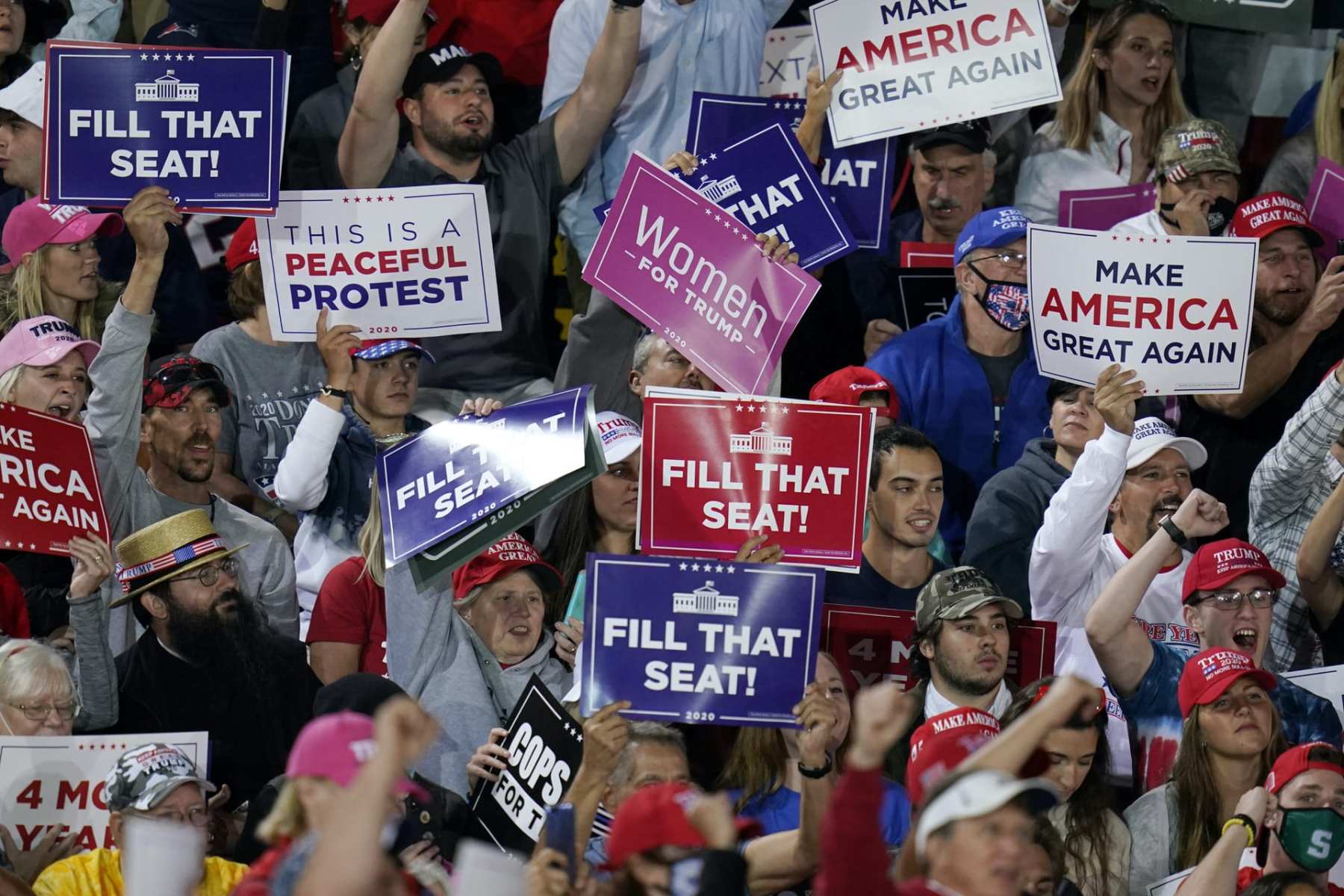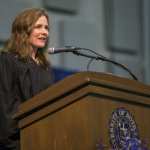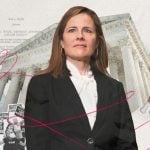One day after Ruth Bader Ginsburg’s death, President Donald Trump pledged he would replace her position on the U.S. Supreme Court with a woman. “It will be a woman,” Trump told a crowd in Fayetteville, North Carolina. “A very talented, very brilliant woman.” Trump said he expects to announce his nominee on Saturday.
Last week, before Ginsburg’s death, the president released a list of contenders in case of a vacancy. Of the 44 people on it, 12 were women. Since Trump announced that his nominee would be a woman over the weekend, five names have surfaced as the most likely picks: Amy Coney Barrett, Barbara Lagoa, Joan Larsen, Allison Jones Rushing and Kate Comerford Todd.
When RBG was confirmed in 1993, she sailed through the process with a 96-3 vote. She later lamented how partisan the Supreme Court confirmation process had become — and now, it seems the Senate is poised for another acrimonious vote.
Senate Majority Leader Mitch McConnell committed to filling the seat before the year’s end, though it’s unclear if that will happen before or after the election, and Republican leadership has indicated that they have the votes to confirm a pick. But though Democrats have few tools to slow a nomination, they will likely scrutinize the nominee’s record in what could be particularly bruising confirmation hearing.
Amy Coney Barrett, 7th U.S. Circuit Court of Appeals
Trump appointed Barrett in May 2017 to be a judge on the 7th U.S. Circuit Court of Appeals in Chicago. She was confirmed by the Senate in October 2017. Before becoming a judge, she was a professor at Notre Dame Law School.
Barrett, 48, was thought to be a one of Trump’s top picks for the vacancy created by the 2018 retirement of Justice Anthony Kennedy, a conservative who sometimes sided with the court’s liberals on high-profile social issues such as same-sex marriage and some abortion cases. Justice Brett Kavanaugh was ultimately nominated and confirmed to that seat.
If Barrett is Trump’s pick, she will likely face even fiercer opposition from Democrats than other potential justices. During Barrett’s confirmation hearings to the 7th Circuit, Senate Democrats questioned her about her religious beliefs to the extent that Republicans said they were being anti-Catholic. Democrats and abortion rights supporters criticized law review articles that Barrett had written about her positions on the intersection of law and religious faith.
In one, Barrett wrote that Catholic judges were in a “legal bind” in cases related to abortion and the death penalty. Barrett told Democratic senators during her confirmation hearings in 2017 that she would not bring her personal opinions to the court, nor would she recuse herself from death penalty cases. In another article, she criticized the judicial principle of stare decisis, which means judges are compelled to respect settled law. Liberals are worried Barrett would not feel beholden to the precedent set by Roe v. Wade, the landmark abortion access law that was decided by the Supreme Court in 1973.
Barrett has also faced accusations that her religious beliefs cloud her ability to rule on LGBTQ+ issues. Three years ago, 27 LGBTQ+ advocacy organizations opposed her nomination to the 7th Circuit, citing her signature on a letter that praised the Catholic church’s teachings “on marriage and family founded on the indissoluble commitment of a man and a woman.” Barrett has also been pressed on her past teachings for Alliance Defending Freedom, an anti-LGBTQ+ legal organization that the Southern Poverty Law Center has designated as a hate group.
Health law experts believe Barrett would, depending on when she is confirmed, likely rule against the Affordable Care Act in a pending lawsuit that would strike down the entire law. Barrett has previously suggested that at least one previous case — King v. Burwell, which upheld the law — was incorrectly decided. Her writing has also indicated an openness to the argument that NFIB v. Sebelius, which also upheld the ACA, was a decision made in error as well, noted Katie Keith, a health law professor at Georgetown University.
Barrett graduated from Rhodes College in 1994, and received her law degree from Notre Dame University in 1997.
Barbara Lagoa, 11th U.S. Circuit Court of Appeals
A year ago, Trump announced Barbara Lagoa as one of his appointments to the 11th Circuit Court of Appeals. If she were to become the next Supreme Court justice, the 52-year-old would be only the second Latina to serve in its history.
“She is an extraordinary person,” Trump said of Lagoa on Saturday. “I’ve heard at length about her. She’s Hispanic and she’s highly respected.”
With a bipartisan 80-15 vote in the Senate, Lagoa joined five other Trump-appointed justices who now make up half of the 11th Circuit, which handles appeals cases out of Alabama, Florida and Georgia. Earlier this month, Lagoa weighed in on Jones v. Florida, which included the nation’s only 19th Amendment felony disenfranchisement suit, ignoring calls from the Southern Poverty Law Center and other plaintiffs to recuse herself. (Plaintiffs took issue with Lagoa’s involvement in a related voting-rights matter while serving on the Florida Supreme Court.) She sided with the majority in overturning a lower court ruling that allowed formerly incarcerated people to vote without paying fines and fees owed to the court.
Lagoa became the first Latina to serve on the Florida Supreme Court when she was appointed by Gov. Ron DeSantis in January 2019. Lagoa is Cuban American, born to exiles who raised her in Hialeah, Florida. In 2006, Gov. Jeb Bush appointed her to Florida’s 3rd District Court of Appeals, and before that, she was an assistant U.S. attorney for the Southern District of Florida in Miami. She attended Florida International University undergrad and went on to Columbia Law School, where she was the associate editor of the Columbia Law Review.
Lagoa is also a member of the Federalist Society. In February 2020, as a panelist at the society’s Annual Florida Chapters Conference, Lagoa talked about her philosophy of disagreeing with her colleagues without being disagreeable, and how she didn’t ever have any problem speaking or raising her voice as the only woman on the state’s highest court.
Leonard Leo, co-chairman of the Federalist Society, endorsed Lagoa when she was being considered for Florida’s supreme court.
Alliance for Justice, a coalition of 120 progressive organizations, opposes Lagoa, citing her rulings that helped block a minimum raise wage in Miami Beach, and her decisions that cemented protections for mortgage companies and big banks.
Joan Larsen, 6th U.S. Circuit Court of Appeals
Trump appointed Larsen to be U.S. Circuit Judge for the 6th Circuit in Cincinnati on May 8, 2017. She was confirmed that November by a vote of 60-38. Larsen, 51, also appeared on President Trump’s list of potential Supreme Court justices in 2017.
Before serving as circuit judge, Larsen sat on the Michigan Supreme Court for two years, and served as deputy assistant attorney general in the U.S. Department of Justice, Office of Legal Counsel under George W. Bush. She also worked as a law clerk under Judge David B. Sentelle of the U.S. Court of Appeals for the D.C. Circuit and Justice Antonin Scalia of the Supreme Court. Larsen looked to Scalia as a mentor and wrote that his passing “leaves a giant void in the court.”
Progressives oppose Larsen’s conservative record and are wary of her close relationship with the late Justice Scalia.
Larsen received her B.A. from the University of Northern Iowa and graduated first in her class from Northwestern University School of Law.
Allison Jones Rushing, 4th U.S. Circuit Court of Appeals
Trump nominated Rushing to the 4th Circuit Court of Appeals in August 2018; she was confirmed the following March on partisan lines, with 53-44.
At 38, she would be the youngest justice to ever serve on the high court. Prior to her judicial confirmation, she worked as a partner at Williams & Connolly, a D.C.-based law firm, where she practiced for about a decade.
Rushing, who previously clerked for Justice Clarence Thomas and Neil Gorsuch when he was at the 10th Circuit Court of Appeals, drew fire in her last confirmation process from Democrats and supporters of LBGTQ+ rights, who pointed to her work with the anti-LGBTQ+ group Alliance Defending Freedom.
The AFL-CIO, the largest U.S. labor federation, also opposed her nomination, citing her limited experience as well as her work on a case that ultimately became part of Epic Systems Corp v. Lewis, a 5-4 decision that allowed contracts to bar employees from collective bargaining. Rushing argued that an employer could require someone to surrender the right to collective bargaining as part of a contract.
A Supreme Court confirmation process would likely be even more heated, and her work with Alliance Defending Freedom could play a central role.
The group is known for its opposition to same-sex marriage, and played a critical role in cases including Masterpiece Bakeshop v. Colorado, which found in favor of a bakery that refused to sell a wedding cake to two men. It also was behind the model legislation that states used to pass so-called “bathroom bills,” which effectively barred trans people from using bathrooms that matched their gender.
Abortion and reproductive health could also emerge as a key topic in a Rushing confirmation. Though she has not weighed in publicly on either issue, Alliance Defending Freedom has advocated for anti-abortion interests in multiple Supreme Court lawsuits, and represented Hobby Lobby in the landmark Supreme Court case that exempted more companies from covering contraception for their employees, as required by the Affordable Care Act.
Rushing graduated from Wake Forest University in 2004, and finished her law degree three years later, at Duke University. She is a member of the Federalist Society.
Kate Comerford Todd, White House deputy counsel
Comerford Todd, 45, is a deputy White House counsel in the Trump administration. She is the only nominee on Trump’s list of potential Supreme Court nominees who has not previously served as a judge.
The Associated Press noted that though her lack of previous experience as a judge may lead to contention in the confirmation process, it could also serve to her advantage. Neil Gorsuch and Brett Kavanaugh, Trump’s other two nominees, were heavily scrutinized for their past rulings, but Comerford Todd has no clear history to signal how she may rule on future matters.
She served as associate counsel to the president under George W. Bush and as a law clerk to Justice Clarence Thomas. Before joining the Trump administration, she worked as a partner at Wiley, Rein & Fielding, in Washington, D.C.
Comerford Todd received her undergraduate degree from Cornell and graduated magna cum laude from Harvard Law School.
Amanda Becker and Alexis Lanza contributed reporting.




